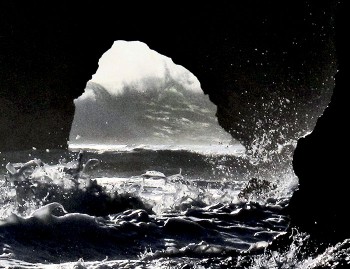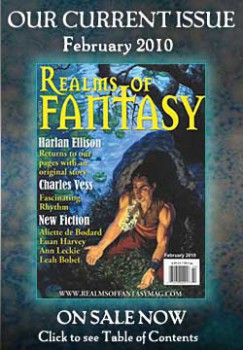Short Fiction Beat: Polyphony 7?
Via Torque Control I just learned that Wheatland Press won’t publish the seventh volume of its Polyphony series unless it gets a certain number of pre-orders by March 19, 2010. Of course, that was yesterday, but perhaps there’s still time to come to the rescue. My order was processed (no need to worry, by the way, that you might lose your money; the publisher promises to refund all orders if the book is ultimately aborted).
In fact, I’ve never read any of this series. But a quick scan of the authors for this volume and previous ones tells me I perhaps should have.
Hey, the economy is picking up. What better way to celebrate than to contribute to a stimulus plan for a book publisher.
 The latest issue of webzine
The latest issue of webzine  Here are the
Here are the  Some periodicals are closing, while others are resurrected. The latest revival is
Some periodicals are closing, while others are resurrected. The latest revival is  The
The  I just stumbled upon this spin on a subscription plan to support
I just stumbled upon this spin on a subscription plan to support  This past week I saw both
This past week I saw both  might be struck by the special effects of the latter (I particularly like the scene where Tom Waits as the devil unfurls his umbrella and casually steps off a cliff, at which point little white clouds appear to support each of his steps so he doesn’t plummet to the ground), except now it (and maybe everything else) pales in comparison to Avatar, which is as visually stunning as all the hype suggests, assuming all you expect from going to a movie is a cool light show. Not that there’s anything wrong with that. But, for my money, the better movie, even with its flaws is The Imaginarium of Doctor Parnassus. Why?
might be struck by the special effects of the latter (I particularly like the scene where Tom Waits as the devil unfurls his umbrella and casually steps off a cliff, at which point little white clouds appear to support each of his steps so he doesn’t plummet to the ground), except now it (and maybe everything else) pales in comparison to Avatar, which is as visually stunning as all the hype suggests, assuming all you expect from going to a movie is a cool light show. Not that there’s anything wrong with that. But, for my money, the better movie, even with its flaws is The Imaginarium of Doctor Parnassus. Why? The new Realms of Fantasy coincides with the relaunch (as of December 11, 2009) of an actually informative
The new Realms of Fantasy coincides with the relaunch (as of December 11, 2009) of an actually informative